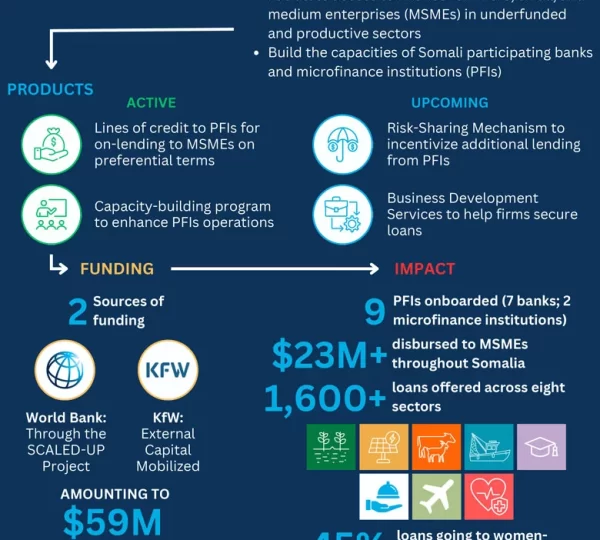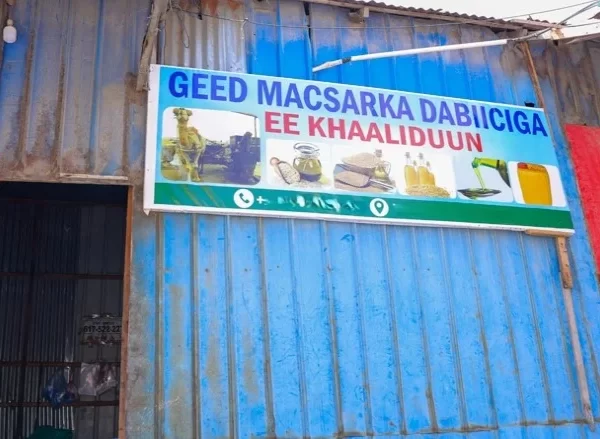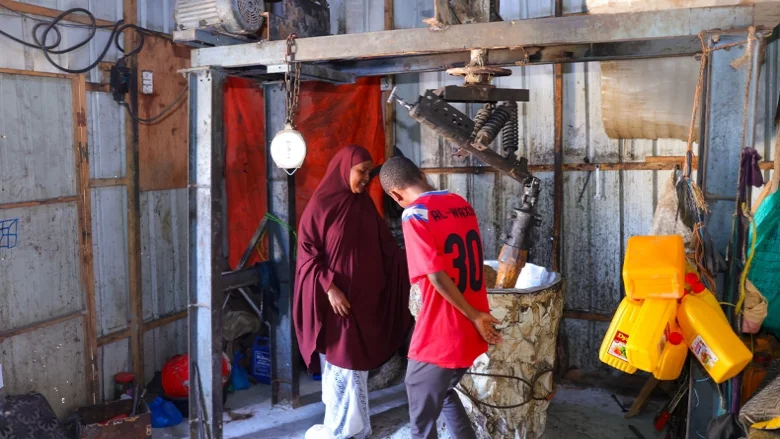When Rima Abdukadir Ahmed initially created her cold press for extracting sesame oil, she embraced a traditional method—utilizing a camel to move a grindstone. Operating her business in a bustling area of Mogadishu, Rima tapped into a niche market that she identified herself, catering to customers seeking sesame oil for medicinal purposes. Over time, she innovated by replacing the camel with a mechanical system powered by automobile components, such as a transmission, drive shaft, and differential. This shift not only eliminated the need for space and feed for the camel but also made her operations more efficient.
Renowned for its nutritional benefits and rich flavor, sesame oil is widely used in cooking, and the superior quality of Rima’s oil allowed her to command higher prices than the market average. However, to consistently meet demand throughout the year, she needed to address supply fluctuations by increasing her sesame seed storage. For this, she required additional working capital.
To expand her operations, Rima approached Premier Bank in Mogadishu. Her business, named Macsarada Salida Khaaluduun (Khaaluduun Sesame Oil), has been part of a value chain since 2016, establishing her reputation as a credible entrepreneur. This credibility played a significant role in securing a loan of $2,200 from the bank. The loan, structured over two years, carried an 8% annual interest rate and required one guarantor. A four-month grace period allowed Rima to stockpile sesame seeds before the rainy season, a period when harvests typically decline.
The loan’s repayment plan was calculated using market data, with camel-powered sesame oil priced at an average of $5.50 per liter. This translated to monthly repayments of $116 over 20 installments. With the loan, Rima was able to increase her storage capacity and production, boosting her output from 150 liters to 400 liters per month. This not only ensured a steady supply of high-quality oil but also provided sufficient income to cover her loan repayments, maintain her equipment, and fund necessary repairs.

The Importance of Financial Access
Accessing capital remains a significant challenge in Somalia, particularly for entrepreneurs managing Micro, Small, and Medium Enterprises (MSMEs) in productive sectors like agriculture, fishing, and livestock. Despite their potential to drive economic growth and job creation, these sectors are often deemed high-risk by Somali financial institutions.
A recent World Bank survey revealed that only 46% of Somali businesses could access overdraft facilities, with women-owned enterprises facing even greater difficulties at a mere 21%. The World Bank Group’s Somalia Country Private Sector Diagnostic report also highlights the persistent challenges MSMEs face in accessing finance.
In response, the Somali federal government launched the Gargaara Company in 2019 to provide financing to underserved businesses in productive sectors, including renewable energy projects. Initially supported by $15 million from the World Bank’s Somalia Capacity Advancement, Livelihoods, and Entrepreneurship through Digital Uplift Project (SCALED-UP), the facility received an additional $25 million during the COVID-19 pandemic to expand its impact.
Gargaara operates as an apex institution, channeling funds through Participating Financing Institutions (PFIs). It currently collaborates with nine PFIs, which include seven of Somalia’s 13 commercial banks and two microfinance institutions. By improving access to funding, Gargaara has enabled farmers, fishermen, pastoralists, and renewable energy entrepreneurs to grow and sustain their businesses.
In 2023, Gargaara secured an additional $19 million from the German development bank Kreditanstalt für Wiederaufbau (KfW). This funding has allowed the organization to diversify its portfolio, extending support to sectors like education, healthcare, hospitality, and small-scale manufacturing.

Expanding Gargaara’s Reach
The SCALED-UP initiative, funded with $101 million from the World Bank’s International Development Association and the Somalia Multi-Partner Fund, aims to enhance access to digital financial services and foster entrepreneurship, particularly for women. Since its inception, the Gargaara Financial Facility has issued over 1,600 loans to Somali entrepreneurs, empowering individuals like Rima to expand their operations.
Despite these successes, gender disparities persist. While nearly half of the loans by number have been issued to women-owned businesses, these account for less than 10% of the total loan value, amounting to over $23 million so far. This gap underscores the ongoing need for targeted support for women entrepreneurs.
Rima’s story illustrates the transformative impact of access to finance. With the additional capital, she not only scaled up her operations but also began exploring new markets and planning for a second grinding mill at a new location. Premier Bank’s approach of assessing her repayment capacity based on cash flow rather than collateral highlights the importance of personalized engagement, particularly with women entrepreneurs.
Looking ahead, Gargaara plans to amplify its influence by adopting a more comprehensive strategy to increase credit availability. This includes onboarding additional financial institutions, enhancing their capacity to support women-run MSMEs, and introducing new financial products like risk-sharing mechanisms and business development services. By strengthening both ends of the financial system, Gargaara aims to attract more funding and expand its reach to underserved entrepreneurs.

